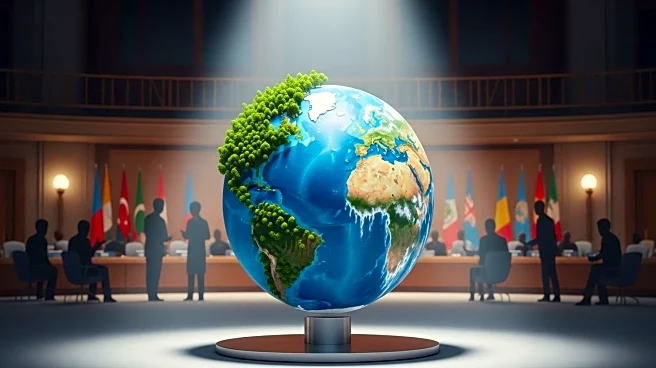What's Happening?
Over 110 world leaders are gathering at a special U.N. climate summit in New York to discuss strengthening national plans to reduce reliance on coal, oil, and natural gas. This summit coincides with New York Climate Week, which features over 1,000 events focused on promoting greener energy solutions. Despite the global push for renewable energy, the U.S. is experiencing significant climate policy rollbacks, described as the most aggressive in history by Climate Action Tracker. European Commission President Ursula von der Leyen emphasized the economic benefits of renewable energy, noting that 90% of new projects are cheaper than fossil fuels. Last year, global investment in renewable energy reached $2 trillion, double the amount spent on fossil fuels.
Why It's Important?
The summit highlights the global commitment to combating climate change, despite setbacks in U.S. policy. The shift towards renewable energy is crucial for reducing greenhouse gas emissions and mitigating climate change impacts. The economic advantages of renewables, as highlighted by von der Leyen, suggest a promising future for cleaner energy solutions. However, the U.S. policy rollbacks could hinder progress and affect international climate agreements. The summit serves as a platform for leaders to reaffirm their commitments and push for more ambitious climate action, which is essential for achieving the goals set in the Paris Agreement.
What's Next?
Countries are expected to submit new five-year plans for carbon emission reductions by the end of the month, ahead of the climate negotiations in Brazil. The U.N. session aims to encourage nations to enhance their climate commitments. China and the European Union are anticipated to announce their plans during the summit. Small island nations, severely affected by climate change, plan to propose a resolution at the U.N. General Assembly to enforce action based on the International Court of Justice's ruling. The outcome of these discussions could influence future international climate policies and agreements.
Beyond the Headlines
The summit underscores the ethical responsibility of nations to address climate change, especially for vulnerable regions like small island states. These areas face existential threats from rising sea levels and extreme weather events, which they did not contribute to. The disparity in climate action and its impacts raises questions about global equity and justice. The summit also highlights the role of business leaders in driving sustainable practices and investments, which are crucial for achieving long-term climate goals.











